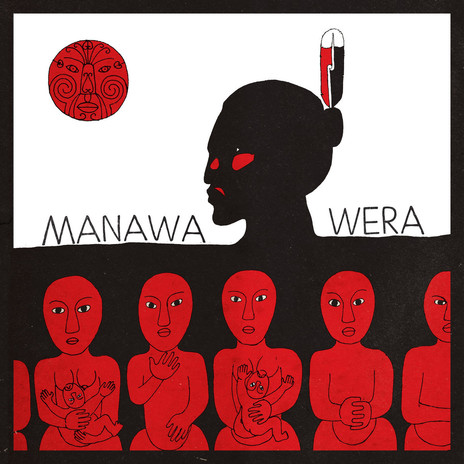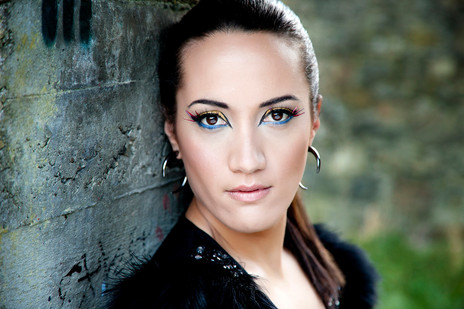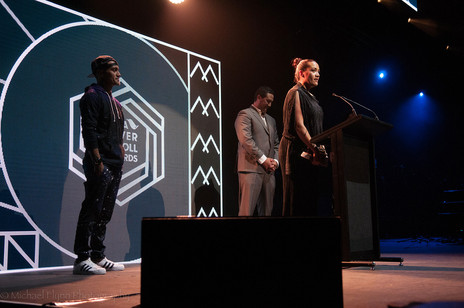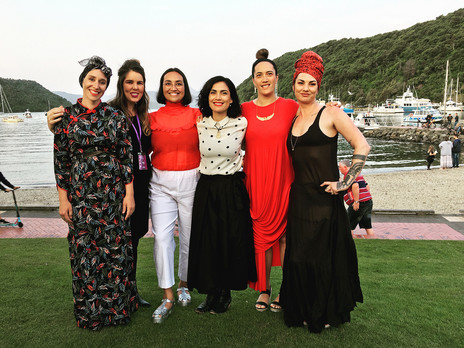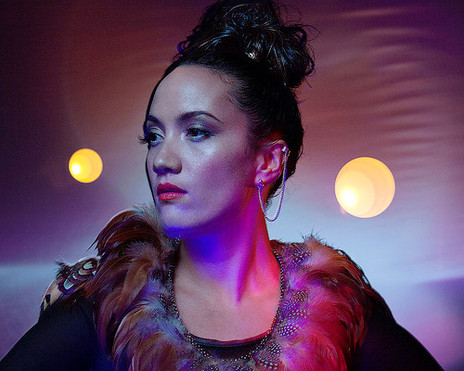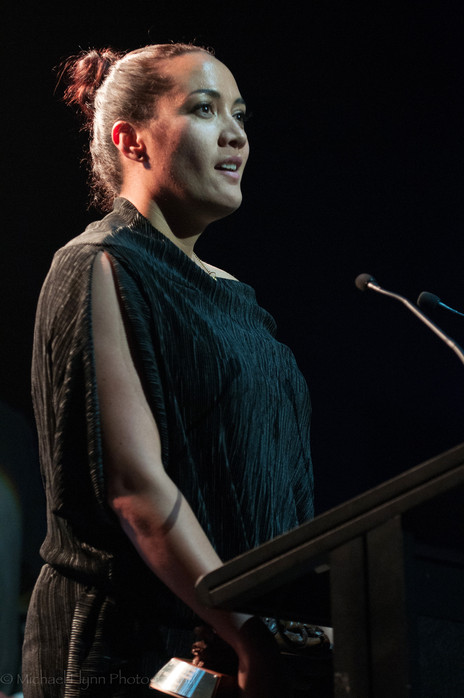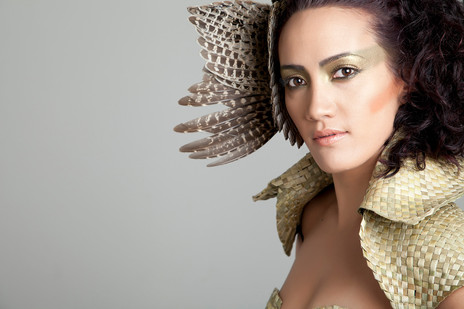Hall (Ngāi Te Rangi, Ngāti Ranginui, Te Whānau ā Apanui, Ngāti Porou, Ngāti Tūwharetoa, Waikato), fell into music at a young age after joining the church choir based out of her marae. Kapa haka, which she did throughout primary, intermediate and high school, also gave her an opportunity to engage on a number of different levels with her culture. “When you do kapa haka, it’s not just performing a song,” she explains. “You’re actually learning history, genealogy, tribal links and associations between your neighbours. It’s all encompassing.”
Through kapa haka, she found her calling as a vocalist. While still at high school, she was already singing cover songs at local gigs. After graduating she moved to Auckland and then on to Queensland, where she spent two years between the Gold Coast and Brisbane working up her performance and vocal skills.
RIA HALL FOUND HER CALLING AS A VOCALIST THROUGH KAPA HAKA.
After the stint in Australia, she moved again: this time to Wellington, where she was determined to forge a real career out of music. In 2006, she formed reggae band Hope Road, who went on to perform at One Love and the Parihaka International Peace Festival. It was a good start for her, she explains, but a clash of personalities brought the band to an end.
“There were probably too many leaders at the time. Not only that – everyone has their own lives to live and their own jobs. They couldn’t fully commit to putting every single thing into creating something else with our band. Even though it was an amazing experience, I saw that and I said to myself, ‘I’ve learned this from that space but I’m ready to do my own thing now.’”
Hall was already beginning to make an impression on the local scene. She toured Europe with Hollie Smith in 2008 for the release tour of Long Player, and later went on to join acclaimed Wellington act TrinityRoots for another series of shows. “I learnt how important it was to respect such musicality and the level of musicianship, songwriting and class that they bring to the fore,” she says. “I really was inspired by that because I’m a person that always chooses not to give anything less but the absolute best that the audience deserves. I think that’s because the calibre of artists that I’ve had the pleasure of learning from and working with.”
In 2011, Hall joined the ever-expanding cast of Fly My Pretties, performed at the opening ceremony of the Rugby World Cup, and released her first solo EP, which went onto win Best Māori Album at the Vodafone NZ Music Awards in 2012. The five-song, self-titled record was executive produced by Riki Gooch of TrinityRoots, who helped bring elements of hip-hop, roots, reggae and soul to the forefront of Hall’s sound. “I didn’t want it to be predictable,” she said of the release. “I didn’t want anyone to think ‘it’s just another EP by another Wellington artist who happens to be singing in Māori as well as English. We know what sound we’re going to get here.’”
It wasn’t until Hall and Gooch talked again over dinner that the idea to follow up the EP with a concept album came about. “I think he just suggested it because no one was doing it anymore,” says Hall. “I was like, ‘that’s a really good idea’. I could see it already in my head what it could be.”
Five years in the making, Rules of Engagement was released in 2017 to high praise and Hall went onto win the APRA Maioha Award the following year with Tiki Taane (Ngāti Maniapoto) and Te Ori Paki (Tuwharetoa, Tūhoe, Tainui) for the single ‘Te Ahi Kai Pō’. Hall had moved back to Tauranga to finish the record. “I left Wellington and life changed,” she says. “I had to get myself into a good space before I could finish everything off. And money, there’s always that as well.”
More than 150 years on, the Rules of Engagement letter written by Henare Taratoa proved to be just the inspiration Hall needed to write the record. The letter stated that captured soldiers at The Battle of Gate Pā would not be killed and unarmed Pākehā, women and children would be spared. “There was so much compassion and a sense of maintaining one’s mana and integrity in a predicament that asks you to murder and to pillage and to plunder,” says Hall.
Interspersed throughout Rules of Engagement is a series of archival recordings she found of her grandfather’s older brother, Turirangi Te Kani, speaking about the battles of Pukehinahina and Te Ranga. “He helped weave everything together,” Hall says. “So when I found him, I found the real purpose of the record.”
When Hall asked Che Fu if he wanted to collaborate, he wrote back in minutes.
Almost 20 years on from her high school obsession with 2b S.Pacific, Hall sent Che Fu a message asking if he’d be interested in collaborating. He wrote back within minutes: “I’m so keen to do something with you.” Together they wrote ‘Tell Me’, a reggae protest anthem confronting inequality in New Zealand. “It was such an honour to work with him,” says Hall. “To work with a man of his calibre and of his standing in musical society. A man who has been brought up on protest music.”
Lyrically, the album draws on themes of love, war, hope and understanding. The idea was to take people on an emotive journey throughout the whole record. To make them feel something, whether it’s anguish, despair, or a sense of resolution. “If you’re not feeling anything from it,” says Hall, “then I don’t know if you’re human.”
A who’s who of local talent worked on the album’s production, including Tiki Taane, Electric Wire Hustle, Laughton Kora and Kings. Songs such as ‘Sing Dance Dream’ and ‘Forever’ are vibrant and uplifting, while ‘They Come Marching’ is Hall at her fiercest. “If it’s war you wanna press on me,” she sings, “I’ll be ready.”
In 2018, Hall joined forces with another renowned Māori artist, Rob Ruha, for Behind The Lines, a series of thought-provoking shows that looked to start a discussion around who we are as a nation. Hall’s chief aim in music, she told Stuff in 2017, is to challenge the accounts of New Zealand history, and increase understanding and empathy between Māori and Pākehā.
“I don’t want to follow any trends,” she says. “I don’t actually give a shit about what’s happening in the mainstream or what anyone else is doing. I just want to do what feels good. If it feels good for me then the audience will gravitate to it.”
--
In 2020 Hall released her second album, Manawa Wera (Loop). Written and co-produced with Laughton Kora, the album was inspired by reggae albums of the 1970s by artists such as Third World, Jimmy Cliff, Steel Pulse, Bob Marley, and Herbs. Alongside Anna Coddington, Troy Kingi and others, in 2021 Hall took part in the te reo EP Kono 003 to mark the year’s te wiki o te reo Māori. Halls’ waiata ‘Rangatira’ – a translated version of the political anthem ‘Owner’ – is a finalist in the 2022 APRA Maioha Award.
